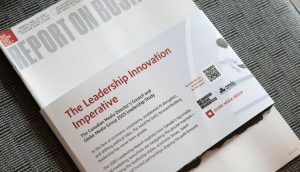Out of 100 of the world’s biggest and most recognizable brands, Microsoft has been named the most influential among Canadians in a poll by Ipsos Reid.
Steve Levy, president of Ipsos Reid, presented the top 10 yesterday, during his talk at the Advertising Week conference in Toronto.
The top brands and their Influence Index are as follows: Microsoft (427), Google (403), President’s Choice (334), Apple (308), Walmart (293), CBC (228), Facebook (219), Visa (214), YouTube (189), Air Miles (187).
To determine which brands made the cut, Ipsos Reid asked 1,013 adults to rate each of the 100 leading brands on six dimensions, which include leading edge, trustworthiness, relevancy, engagement, presence and corporate citizenship. Those that possessed the strongest mix of the defining characteristics were added to the shortlist.
According to Levy, Microsoft spends close to a tenth of what auto brand Ford does on advertising, yet the brand has a considerable presence among consumers. Canadian respondents feel that the brand is a leader in the industry, with a passion for technology and the ability to set an example for other brands looking to change the consumer landscape.
Google received top marks from consumers, with Levy saying that the brand is a provider of guidance, allowing consumers to find a needle in a haystack in mere seconds. Consumers consider the brand to be an innovator and one that is established, reliable and has a strong future.
President’s Choice is seen by consumers as equal to, if not better, than a name brand, says Levy. The brand is relevant and socially responsible with its sustainable and healthy lifestyle products. In addition, the fact that the brand can do just as well selling chocolate chip cookies as it does providing a banking service shows just how trusted it is, says Levy.
Apple made the list because of its innovation and what consumers say is a “magical” feeling one gets when using its products, says Levy. While it only spends close to $1 million in advertising, the brand has a significant presence in consumers’ lives, he says. Consumers say they trust the brand’s high quality products, with 50% of them saying that they cannot wait to hear what the brand comes up with next.
Walmart, with its 4,000 locations worldwide, made it to the fourth spot on the list because of the investment it has made in being present in consumers’ lives. The brand has an ad spend of about $53 million and consumers recognize this, says Levy, adding that 74% see it as an established brand.
CBC remains a part of Canadian culture, with viewers keep coming back because of notable and familiar presenters such as George Stroumboulopoulos, Peter Mansbridge and Ron MacLean. Consumers believe the CBC to be a trusted, established and dependable brand, says Levy.
Facebook came up seventh because of its leading edge, relevancy and ability to provide engagement. While many social platforms prior to Facebook may have succeeded, none have created such an explosion, says Levy. It is a pacesetter, he adds, and consumers recognize that.
Visa made the list because of its investment in being “everywhere you want it to be,” as well as its relevancy and trustworthiness. Levy says that the brand spends a lot on advertising and is in almost every part of the world. Consumers react well to its presence, saying that they can relate to the brand as many of their friends and family use its services.
YouTube is strongest in the relevancy, engaging and leading edge dimensions, where the brand has created a platform for people to entertain, educate and sometimes shock, says Levy, adding that one in three Canadians uses the channel and many of those polled say they can identify with and are happy to watch or contribute videos to the site.
Air Miles received props for paving the way for other loyalty programs and setting an example, which Levy says makes it a leading edge brand. He adds that the brand changed the consumer landscape and consumers believe it to be an established and trustworthy brand. Its power lies in the massive database that the brand holds, with up to 10 million Canadians using the program, says Levy.
























